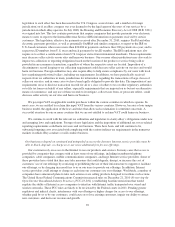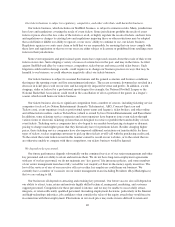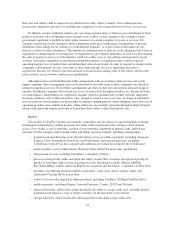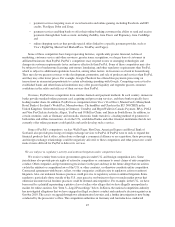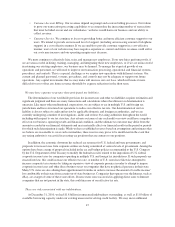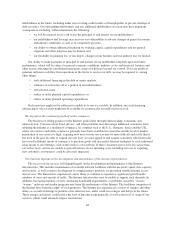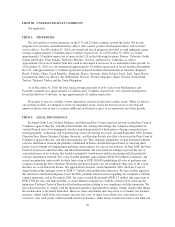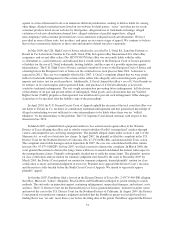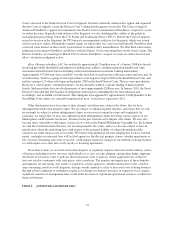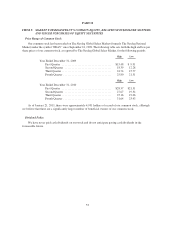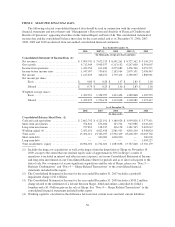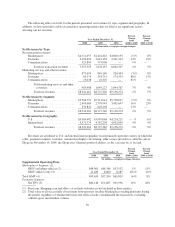eBay 2010 Annual Report Download - page 54
Download and view the complete annual report
Please find page 54 of the 2010 eBay annual report below. You can navigate through the pages in the report by either clicking on the pages listed below, or by using the keyword search tool below to find specific information within the annual report.We may be unable to protect or enforce our own intellectual property rights adequately.
We regard the protection of our trademarks, copyrights, patents, domain names, trade dress, and trade
secrets as critical to our success. We aggressively protect our intellectual property rights by relying on federal,
state and common law rights in the U.S. and internationally, as well as a variety of administrative procedures. We
also rely on contractual restrictions to protect our proprietary rights in products and services. We have entered
into confidentiality and invention assignment agreements with our employees and contractors, and confidentiality
agreements with parties with whom we conduct business in order to limit access to and disclosure of our
proprietary information. Effective intellectual property protection may not be available in every country in which
our products and services are made available, and contractual arrangements and the other steps we have taken to
protect our intellectual property may not prevent misappropriation of our technology or deter independent
development of similar technologies by others.
We pursue the registration of our domain names, trademarks, and service marks in the U.S. and
internationally. Effective trademark, copyright, patent, domain name, trade dress, and trade secret protection is
very expensive to maintain and may require litigation. We must protect our intellectual property rights and other
proprietary rights in an increasing number of jurisdictions, a process that is expensive and time consuming and
may not be successful in every location. We may not be able to discover or determine the extent of any
unauthorized use of our proprietary rights. We have licensed in the past, and expect to license in the future,
certain of our proprietary rights, such as trademarks or copyrighted material, to others. These licensees may take
actions that diminish the value of our proprietary rights or harm our reputation.
We are subject to the risks of owning real property.
We own real property, including land and buildings related to our operations. We have little experience in
managing real property. Ownership of this property subjects us to risks, including:
• the possibility of environmental contamination and the costs associated with fixing any environmental
problems;
• disruptions to our operations resulting from possible natural disasters, interruptions in utilities and
similar events;
• adverse changes in the value of these properties, due to interest rate changes, changes in the
commercial property markets, or other factors;
• the possible need for structural improvements in order to comply with zoning, seismic, disability law,
or other requirements; and
• possible disputes with tenants, neighboring owners, or others.
Some anti-takeover provisions may affect the price of our common stock.
Our Board of Directors has the authority to issue up to 10,000,000 shares of preferred stock and to
determine the preferences, rights and privileges of those shares without any further vote or action by the
stockholders. The rights of the holders of common stock may be harmed by rights granted to the holders of any
preferred stock that may be issued in the future. Some provisions of our certificate of incorporation and bylaws
could have the effect of making it more difficult for a potential acquirer to acquire a majority of our outstanding
voting stock or take control of our board of directors. These include provisions that provide for a classified board
of directors, prohibit stockholders from taking action by written consent and restrict the ability of stockholders to
call special meetings. We are also subject to provisions of Delaware law that prohibit us from engaging in any
business combination with any interested stockholder (as defined by Delaware law) for a period of three years
from the date the person became an interested stockholder, unless certain conditions are met. This restriction
could have the effect of delaying or preventing a change of control.
49


